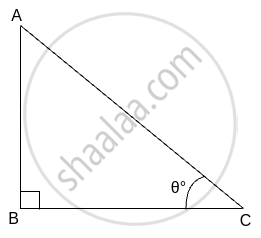Advertisements
Advertisements
प्रश्न
Prove the following identities, where the angles involved are acute angles for which the expressions are defined:
`cos A/(1 + sin A) + (1 + sin A)/cos A = 2 sec A`
उत्तर
L.H.S
`cos A/(1 + sin A) + (1 + sin A)/cos A `
= `(cos^2A+(1+sinA)^2)/((1+sinA)(cosA))`
= `(cos^2A + 1+sin^2A + 2sinA)/((1+sinA)(cosA))`
= `(sin^2+cos^2A+1+2sinA)/((1+sinA)(cosA))`
= `(1+1+2sinA)/((1+sinA)(cosA))`
= `(2+2sinA)/((1+sinA)(cosA))`
= `(2(1+sinA))/((1+sinA)(cosA))`
= `2/(cosA)`
= 2 secA
= R.H.S
APPEARS IN
संबंधित प्रश्न
Prove that sin6θ + cos6θ = 1 – 3 sin2θ. cos2θ.
If acosθ – bsinθ = c, prove that asinθ + bcosθ = `\pm \sqrt{a^{2}+b^{2}-c^{2}`
Prove the following trigonometric identities.
`(tan^3 theta)/(1 + tan^2 theta) + (cot^3 theta)/(1 + cot^2 theta) = sec theta cosec theta - 2 sin theta cos theta`
If a cos θ + b sin θ = m and a sin θ – b cos θ = n, prove that a2 + b2 = m2 + n2
Prove the following identities:
`1/(1 - sinA) + 1/(1 + sinA) = 2sec^2A`
Prove the following identities:
`(1 - sinA)/(1 + sinA) = (secA - tanA)^2`
Prove the following identities:
`(sinA + cosA)/(sinA - cosA) + (sinA - cosA)/(sinA + cosA) = 2/(2sin^2A - 1)`
If `cosA/cosB = m` and `cosA/sinB = n`, show that : (m2 + n2) cos2 B = n2.
If tan A = n tan B and sin A = m sin B, prove that:
`cos^2A = (m^2 - 1)/(n^2 - 1)`
If 4 cos2 A – 3 = 0, show that: cos 3 A = 4 cos3 A – 3 cos A
`(sec^2 theta -1)(cosec^2 theta - 1)=1`
`cos^2 theta + 1/((1+ cot^2 theta )) =1`
Write the value of tan1° tan 2° ........ tan 89° .
If 5x = sec ` theta and 5/x = tan theta , " find the value of 5 "( x^2 - 1/( x^2))`
What is the value of \[\sin^2 \theta + \frac{1}{1 + \tan^2 \theta}\]
If sec θ + tan θ = x, write the value of sec θ − tan θ in terms of x.
If x = a sin θ and y = b cos θ, what is the value of b2x2 + a2y2?
If 5x = sec θ and \[\frac{5}{x} = \tan \theta\]find the value of \[5\left( x^2 - \frac{1}{x^2} \right)\]
Write True' or False' and justify your answer the following :
The value of \[\sin \theta\] is \[x + \frac{1}{x}\] where 'x' is a positive real number .
\[\frac{\tan \theta}{\sec \theta - 1} + \frac{\tan \theta}{\sec \theta + 1}\] is equal to
Prove the following identity :
( 1 + cotθ - cosecθ) ( 1 + tanθ + secθ)
Prove the following identity :
`(1 - tanA)^2 + (1 + tanA)^2 = 2sec^2A`
Prove the following identity :
(secA - cosA)(secA + cosA) = `sin^2A + tan^2A`
Prove the following identity :
`sqrt((1 + sinq)/(1 - sinq)) + sqrt((1- sinq)/(1 + sinq))` = 2secq
Prove the following identities:
`(sec"A"-1)/(sec"A"+1)=(sin"A"/(1+cos"A"))^2`
Choose the correct alternative:
1 + tan2 θ = ?
Prove that: (1+cot A - cosecA)(1 + tan A+ secA) =2.
If cosθ + sinθ = `sqrt2` cosθ, show that cosθ - sinθ = `sqrt2` sinθ.
Prove that (cosec A - sin A)( sec A - cos A) sec2 A = tan A.
Prove the following identities.
cot θ + tan θ = sec θ cosec θ
If x sin3 θ + y cos3 θ = sin θ cos θ and x sin θ = y cos θ, then prove that x2 + y2 = 1
If a cos θ – b sin θ = c, then prove that (a sin θ + b cos θ) = `± sqrt("a"^2 + "b"^2 -"c"^2)`
Choose the correct alternative:
cos 45° = ?
Choose the correct alternative:
Which is not correct formula?
Prove that
`(cot "A" + "cosec A" - 1)/(cot"A" - "cosec A" + 1) = (1 + cos "A")/"sin A"`
Prove that `"cot A"/(1 - tan "A") + "tan A"/(1 - cot"A")` = 1 + tan A + cot A = sec A . cosec A + 1
If 1 + sin2α = 3 sinα cosα, then values of cot α are ______.
If tan θ + sec θ = l, then prove that sec θ = `(l^2 + 1)/(2l)`.
Prove that `(cot A - cos A)/(cot A + cos A) = (cos^2 A)/(1 + sin A)^2`
Find the value of sin2θ + cos2θ

Solution:
In Δ ABC, ∠ABC = 90°, ∠C = θ°
AB2 + BC2 = `square` .....(Pythagoras theorem)
Divide both sides by AC2
`"AB"^2/"AC"^2 + "BC"^2/"AC"^2 = "AC"^2/"AC"^2`
∴ `("AB"^2/"AC"^2) + ("BC"^2/"AC"^2) = 1`
But `"AB"/"AC" = square and "BC"/"AC" = square`
∴ `sin^2 theta + cos^2 theta = square`
